www.aljazeerah.info
News, January 2015
Archives
Mission & Name
Conflict Terminology
Editorials
Gaza Holocaust
Gulf War
Isdood
Islam
News
News Photos
Opinion Editorials
US Foreign Policy (Dr. El-Najjar's Articles)
www.aljazeerah.info
|
Editorial Note: The following news reports are summaries from original sources. They may also include corrections of Arabic names and political terminology. Comments are in parentheses. |
Yemen Has New Houthi Dictator, Shi'i Rebels Control Yemeni Presidential Palace, President Hadi Under De Facto House Arrest
January 21, 2015
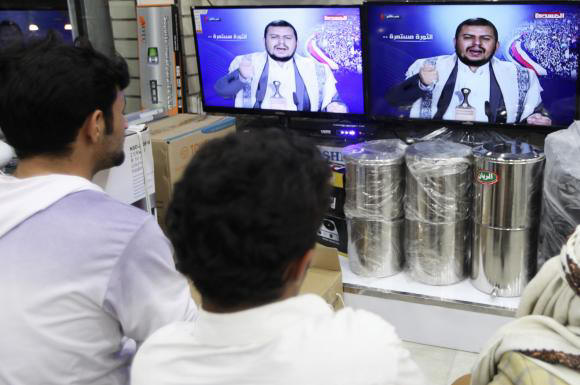 |
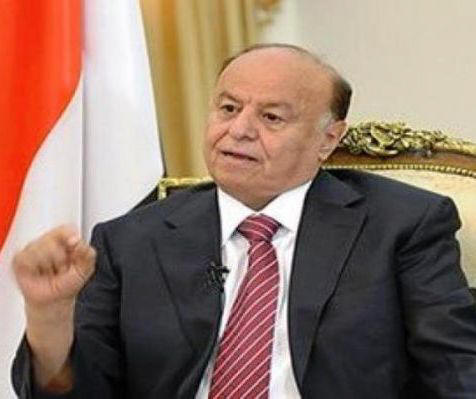 |
| New Yemeni dictator, Abdul Malik Al-Houthi, giving his first national address | President Mansour Hadi has been under house arrest after the Houthi control of the Presidential Palace today, January 21, 2015 |
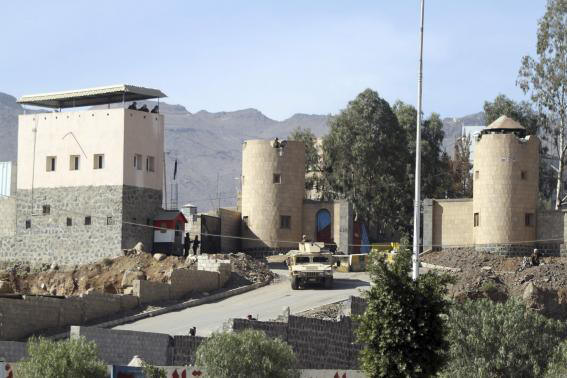 |
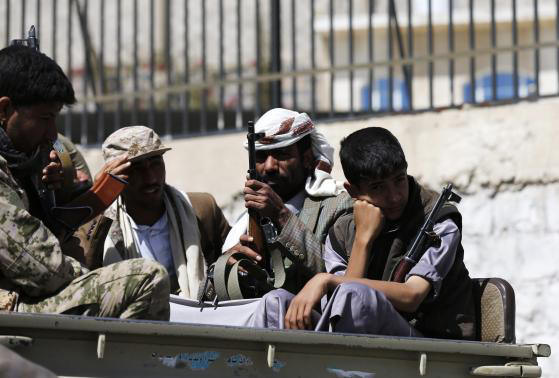 |
| Entrance of the Yemeni Presidential Palace | Houthi fighters |
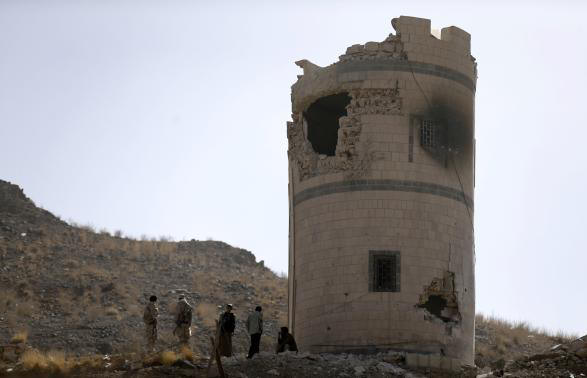 |
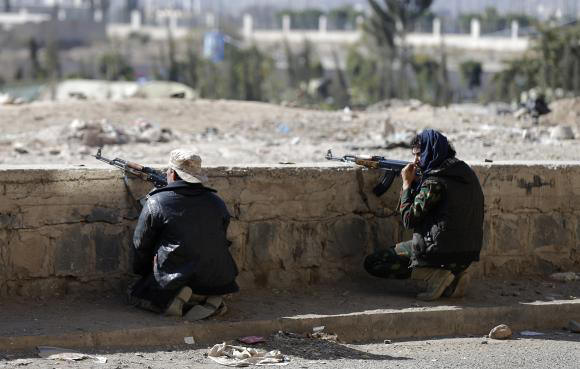 |
| Presidential Palacde post after the battle | Houthi fighters |
Houthi gunmen guard Yemen leader's home, deny overthrowing him
By Yara Bayoumy and Mohammed Ghobari
SANAA Wed Jan 21, 2015 7:33am EST
(Reuters) -
Yemen's minority Shi'ite Houthi fighters took up guard at President Abd-Rabbu Mansour Hadi's home on Wednesday but said they had not toppled him, after two days of fighting which left little doubt that the enfeebled leader was now at their mercy.
The Houthis, friendly to Iran, swept into the capital four months ago and have emerged as the dominant force in the country. For now at least they appear to have decided to stop short of overthrowing Hadi, possibly preferring to exert control over a weakened leader rather than take on the burden of power.
Their defeat of the presidential guards in gunbattles and artillery duels in recent days adds to disarray in a country where the United States is also carrying out drone strikes against one of the most powerful branches of al Qaeda.
After clashes at the president's office and home on Tuesday, the Houthis' leader threatened in a speech overnight to take further "measures" unless Hadi bows to his demand for constitutional changes that would increase Houthi power.
By early morning on Wednesday, Houthi fighters, accompanied by an armored vehicle, had replaced the guards at the president's residence. Presidential guard sentry posts were initially empty, however a few guards later appeared and were permitted to take up positions.
"President Hadi is still in his home. There is no problem, he can leave," Mohammed al-Bukhaiti, a member of the Houthi politburo, told Reuters.
Yemeni military sources said the Houthis also seized the military aviation college located close to Hadi's home, and the main missile base in Sanaa, without a fight.
In the south of the country, Hadi's home region, local officials denounced what they called a coup against him and shut the air and sea ports of the south's main city, Aden.
Yemen, an impoverished nation of 25 million, has been plagued by Islamist insurgency, separatist conflict, sectarian strife and economic crisis for years. An "Arab Spring" popular uprising in 2011 led to the downfall of long-ruling President Ali Abdullah Saleh, bringing more chaos.
The Houthis, rebels from the north drawn from a large Shi'ite minority that ruled a 1,000-year kingdom in Yemen until 1962, stormed into the capital in September but had mostly held back from directly challenging Hadi until last week, when they detained his chief of staff.
They accuse the president of seeking to bypass a power-sharing deal signed when they seized Sanaa in September, and say they are also working to protect state institutions from corrupt civil servants and officers trying to plunder state property.
Houthi fighters battled guards at Hadi's home and entered the presidential palace on Tuesday. In his televised speech that followed, the group's leader Abdel-Malek al-Houthi warned Hadi that he had to implement the power-sharing deal.
"We ... will not hesitate to impose any necessary measures to implement the peace and partnership agreement," said Abdel-Malek, whose Shi'ite Muslim group is widely seen as an ally of Iran in its regional struggle for influence with Saudi Arabia.
"All the options are open and without exception and the ceiling is very, very high. And this is why, I here advise the president ... Implement this deal. It is for your benefit and for the benefit of your people," he said on live television.
The accord gives the Shi'ite Muslim group, which takes its name from the family of its leader, a role in all military and civil state bodies. The Houthis also demand changes to the divisions of regional power in a draft constitution.
Their decision to stop short of toppling Hadi, an ally of the West and supporter of U.S. drone strikes, may be intended to keep regional Sunni Muslim states and the United States from rallying against them.
A government source told Reuters: “They know that if they bring about the downfall of the president, they won’t be able to rule the country, because Western and neighboring countries will gang on up on them, as well as other provinces that are not under their control.”
Abdel-Malek's speech left little doubt however that his movement was now in effective control of the country. Al Masdar newspaper referred to him as "the president's president".
"AGGRESSIVE COUP"
The local security committee of Aden, the main city in the south, said it has ordered the airport, sea port and all land crossings closed until further notice. It denounced an "aggressive coup against the president personally and the political process as a whole".
The emergence of the Houthis as Yemen's de facto top power in September has scrambled alliances across Yemen's political spectrum, raising fears of deeper instability in a country that shares a border with top oil exporter Saudi Arabia and has one of al Qaeda's most active branches.
Foreign ministers of Gulf Arab states, allies of Hadi, were due to discuss the crisis in Yemen at an emergency meeting in the Saudi capital Riyadh later on Wednesday.
Iran called for Yemen's differences to be resolved through discussion: "Misunderstandings among Yemeni political groups need to be removed through talks,” parliament speaker Ali Larijani said on a visit to Turkey.
(Additional reporting by Mohammed Mokhashaf in Aden, Parisa Hafezi in Ankara; Writing by William Maclean and Sami Aboudi; Editing by Peter Graff)
Houthi leader says no one, including president, is above any measures
SANAA Tue Jan 20, 2015 3:50pm EST
(Reuters) -
The leader of Yemen's Houthi said on Tuesday he was determined to implement a power-sharing deal signed last year and warned that no one, including the president, was above what he called "open-ended" moves to see it through.
Abdel-Malek al-Houthi, the Houthi leader, spoke hours after fighters from the Houthi group battled guards at President Abd-Rabbu Mansour Hadi's private home and entered the presidential palace in the capital of Sanaa. Two days of fighting in the capital have raised fears Yemen was descending into chaos.
In a speech broadcast live on television, Houthi also urged Hadi not to listen to foreign advice, which he said would result in dividing Yemen into six regions with devolved powers.
"This move is serious and we are determined and will not hesitate to impose any necessary measures to implement the peace and partnership agreement," Houthi said.
Calling his measures "open-ended," he laid out four demands. They included amending a draft constitution, which now devolves some central government powers to six regions. Houthi said that said was part of a conspiracy imported from abroad.
He also demanded that Hadi use the army to impose security in Yemen, including in the oil-rich Marib province. Tribal leaders in that region have vowed to fight any advance by the Houthis, who have advanced to the borders of the province.
"No one, the president or any one, is above any measure when he stands and implements a conspiracy this bad against this country," Houthi said.
(Additional reporting by Ahmed Tolba in Cairo, writing by Sami Aboudi; Editing by Larry King)
Clashes hit Yemen capital again as Houthis pursue political gains
By Yara Bayoumy and Mohammed Ghobari
SANAA Tue Jan 20, 2015 6:51pm EST
(Reuters) -
Fighters from the Houthi group battled guards at the Yemeni president's private home and entered the presidential palace on Tuesday, witnesses said, as a second day of violence in Sanaa raised fears the country was descending into chaos.
In a speech on live television, Houthi leader Abdel-Malek al-Houthi suggested two days of fighting involving his men were part of an attempt to protect a power-sharing deal meant to steer Yemen to stability.
His speech was critical of President Abd-Rabbu Mansour Hadi, a U.S. ally with whom Houthi has been at odds over a draft constitution intended to help end decades of conflict and underdevelopment.
He said no one, including Hadi, was above any steps when it came to implementing the power-sharing accord, which was negotiated after his men seized Yemen's capital, Sanaa, in September. Houthi prizes the accord as it grants his group participation in all military and civil state bodies.
"We ... will not hesitate to impose any necessary measures to implement the peace and partnership agreement," said Houthi, whose Shi'ite Muslim group is widely seen as an ally of Iran in its regional struggle for influence with Saudi Arabia.
U.N. Secretary-General Ban Ki-moon has condemned the violence and called for order in the country.
The United States remains "firmly committed" to supporting Hadi and his government and is calling for an "immediate cessation of hostilities," a State Department official said.
TENSIONS
Other U.S. officials in Washington, who spoke on condition of anonymity, said they were not sure of Hadi's status or whether he was in either of the buildings under Houthi assault.
They said their latest information from Sanaa indicated Houthi rebels were surrounding Hadi's private residence and were in control, or close to taking control, of his official residence.
The emergence of the Houthis as Yemen's top power in September has scrambled alliances and stoked tensions across Yemen's political spectrum, raising fears of deeper instability in a country that has one of al Qaeda's most active branches.
The U.S. officials said Iran was backing the Houthi rebellion with financial and political support. Some officials said shipments of weapons from Iran to the Yemeni Houthis had been tracked by foreign governments.
Washington has been concerned about the turmoil in part because it relies on the Yemeni government for help in counterterrorism operations against al Qaeda in the Arabian Peninsula (AQAP), which claimed responsibility for the Jan. 7 attacks in Paris.
Yemeni Information Minister Nadia al-Saqqaf said the clashes at Hadi's residence amounted to an attempt to topple Yemen's government, a charge denied by a senior official of the Houthi group.
The clashes followed some of the worst fighting in Sanaa in years on Monday. Guards loyal to Hadi fought artillery battles near the presidential palace with the Houthi, which has been in conflict with Hadi over political and constitutional issues.
"Yemeni president under attack by armed militias seeking the overthrow of the ruling system," Saqqaf said on Twitter on Tuesday evening.
Residents said later the fighting had died down. A government official said two people had been killed.
The minister did not identify the militias, but she said they were firing from nearby houses. Hadi lives in his private home and not in the palace.
NOT TARGETING HADI
Mohammed al-Bukhaiti, a member of the Houthi politburo, said his group had no plans to target Hadi.
"Ansarullah has no intention of targeting President Hadi or his house," Mohammed al-Bukhaiti, a member of the group's politburo, told Reuters, using the group's official name.
He said what happened at Hadi's house was the result of a "provocation" by Hadi's security and that the incident has been contained.
Earlier on Tuesday, Houthi fighters had entered Yemen's presidential palace after a brief clash with security guards, witnesses and security sources told Reuters.
Bukhaiti said the Popular Committees acted at the presidential palace on request from officers who had asked them to help stop a local officer from stealing weapons from the compound.
Washington has made clear that it sees chaos in Yemen as creating conditions that al Qaeda can exploit to strengthen its support and let it use the country for plotting attacks on Western interests.
Even amid the growing turmoil of recent months, U.S. policy makers have praised Yemen’s government for its collaboration on counterterrorism for supporting U.S. drone strikes and special forces operations against militants.
(Writing by Sami Aboudi; Additional reporting by Matt Spetalnick, David Brunnstrom and Mark Hosenball in Washington; Editing by William Maclean, Toni Reinhold, David Storey)
Houthi display of force challenges embattled Yemen leader
By Yara Bayoumy and Mohammed Ghobari
SANAA Wed Jan 21, 2015 12:54am EST
(Reuters) -
Houthi fighters battled guards at the Yemeni president's private home and entered his palace on Tuesday, raising the stakes in a turbulent campaign for more political power that has enfeebled state authority and thrown the Arab state deeper into turmoil.
Speaking hours after his fighters' display of force, Houthi leader Abdel-Malek al-Houthi warned President Abd-Rabbu Mansour Hadi that he had to implement a power-sharing deal struck when his men seized the capital in September.
"All the options are open and without exception and the ceiling is very, very high. And this is why, I here advise the president ... Implement this deal. It is for your benefit and for the benefit of your people," he said on live television.
Houthi prizes the accord as it grants his Shi'ite Muslim group participation in all military and civil state bodies.
"We ... will not hesitate to impose any necessary measures to implement the peace and partnership agreement," said Houthi, whose Shi'ite Muslim group is widely seen as an ally of Iran in its regional struggle for influence with Saudi Arabia.
Hadi, an ally of the West and staunch supporter of U.S. drone attacks on al Qaeda fighters in Yemen, has been also increasingly at odds with Houthi over a draft constitution intended to help end decades of conflict and underdevelopment.
The emergence of the Houthis as Yemen's de facto top power in September has scrambled alliances and stirred tensions across Yemen's political spectrum, raising fears of deeper instability in a country that has one of al Qaeda's most active branches.
Gulf Arab foreign ministers were due to discuss the crisis in Yemen at an emergency meeting in the Saudi capital Riyadh later on Wednesday.
U.N. Secretary-General Ban Ki-moon has condemned the violence and called for order in the country.
The United States remains "firmly committed" to supporting Hadi and his government and is calling for an "immediate cessation of hostilities", a State Department official said.
WEAPONS FROM IRAN?
Other U.S. officials in Washington, who spoke on condition of anonymity, said they were not sure of Hadi's status or whether he was in either of the buildings under Houthi assault.
They said their latest information from Sanaa indicated Houthi rebels were surrounding Hadi's private residence and were in control, or close to taking control, of his official residence.
The U.S. officials said Iran was backing the Houthi rebellion with financial and political support. Some officials said shipments of weapons from Iran to the Yemeni Houthis had been tracked by foreign governments.
Washington has been concerned about the turmoil in part because it relies on the Yemeni government for help in counterterrorism operations against al Qaeda in the Arabian Peninsula (AQAP), which claimed responsibility for the Jan. 7 attacks in Paris.
Yemeni Information Minister Nadia al-Saqqaf said the clashes at Hadi's residence amounted to an attempt to topple Yemen's government, a charge denied by a senior official of the Houthi group.
The clashes followed some of the worst fighting in Sanaa in years on Monday. Guards loyal to Hadi fought artillery battles near the presidential palace with the Houthi.
"Yemeni president under attack by armed militias seeking the overthrow of the ruling system," Saqqaf said on Twitter on Tuesday evening.
Residents said later the fighting had died down. A government official said two people had been killed.
The minister did not identify the militias, but she said they were firing from nearby houses. Hadi lives in his private home and not in the palace.
Mohammed al-Bukhaiti, a member of the Houthi politburo, said his group had no plans to target Hadi. "Ansarullah has no intention of targeting President Hadi or his house," Mohammed al-Bukhaiti, a member of the group's politburo, told Reuters, using the group's official name.
He said what happened at Hadi's house was the result of a "provocation" by Hadi's security and that the incident has been contained. Earlier on Tuesday, Houthi fighters had entered Yemen's presidential palace after a brief clash with security guards, witnesses and security sources told Reuters.
Bukhaiti said the Popular Committees acted at the palace on request from officers who had asked them to help stop a local officer from stealing weapons from the compound.
(Writing by Sami Aboudi; Additional reporting by Matt Spetalnick, David Brunnstrom and Mark Hosenball in Washington; Editing by William Maclean, Toni Reinhold, David Storey)
***
Share this article with your facebook friendsFair Use Notice
This site contains copyrighted material the
use of which has not always been specifically authorized by the copyright
owner. We are making such material available in our efforts to advance
understanding of environmental, political, human rights, economic,
democracy, scientific, and social justice issues, etc. We believe this
constitutes a 'fair use' of any such copyrighted material as provided for
in section 107 of the US Copyright Law. In accordance with Title 17 U.S.C.
Section 107, the material on this site is
distributed without profit to those
who have expressed a prior interest in receiving the included information
for research and educational purposes. For more information go to: http://www.law.cornell.edu/uscode/17/107.shtml.
If you wish to use copyrighted material from this site for purposes of
your own that go beyond 'fair use', you must obtain permission from the
copyright owner.
|
|
|
|
||
|
||||||


